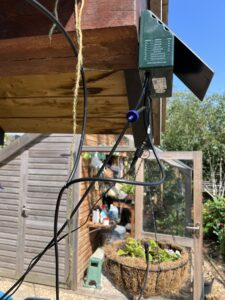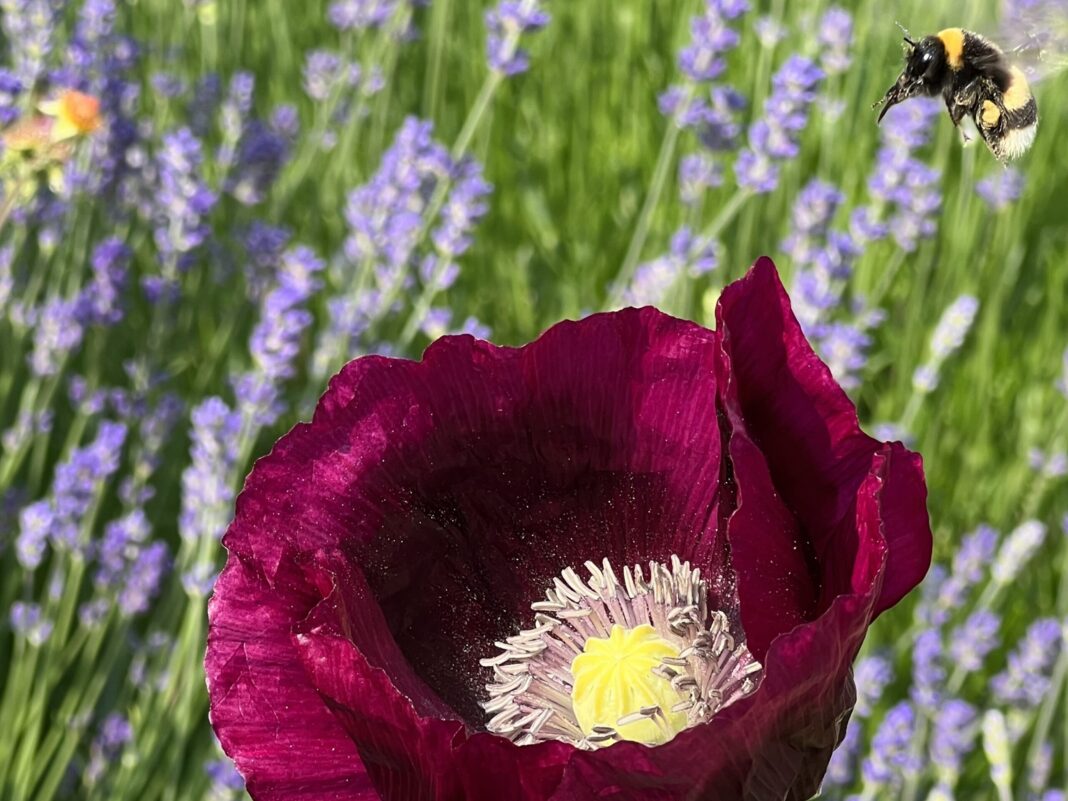Every gardening column I have read recently has mentioned the roses… they are all blooming and huge and stunning. My favourite flower this month though is the poppy.
Each flower may only last a day, but it is an abundance of nectar for the bees. I know expert gardeners say “Chelsea chop” in May, and wisteria pruning in July, but I have been hard pruning this week, cutting back new green shoots on many bushes and climbers.
The caveat to how wonderful the garden is looking is the lack of “bad” insects that seem to be infecting our plants. Few greenfly, few aphids, and in the last two weeks, almost no slugs or snails. And all that means little food for the fledgling birds trying to learn to fend for themselves. We don’t feed our birds, but this week I broke that rule and I have been putting out some dried mealy worms and fresh cherries to try to tide over our baby blackbirds and thrushes.
I have also found the horrible remains of half eaten birds left by neighbour’s cats. Please, if you have a cat, spare a thought for the wildlife. The cats may eat mice and rats, but they also eat birds. Especially my baby birds. Bells and ribbons do help. Keeping them inside is better.
In the allotment, June is the month we can begin to relax a bit. Most of the planting is done, early potatoes are beginning to flower, and watering is the main task as we wait for the first vegetable harvest. Our strawberries are ripening – we have already had a few desserts-worth. The bad news is sawfly has returned on our gooseberries. They like one bush in particular, and I can spend hours lying on the ground, carefully inspecting the underside of leaves and picking off caterpillars.
We are planning to continue pruning out lower hanging branches, and creating a more open canopy to reduce future infestation. We are also trying to stop our plum trees being infected by plum moth. If you have ever cut open a plum and found a little pink caterpillar you will understand how horrible these insects can be. We have bought a pheromone trap and hung it amongst the branches. Supposedly June is the prime time when the moth are most active.
 Finally, we are planning summer holidays which can lead to rather heated domestic arguments about “How can we go away for that long and leave the greenhouse?” There are various self-watering systems that work well, depending on how long you are away. A few days? Then inverting big plastic bottles with a dripper can work well. You can also get pots which are planted directly into grow bags with a small water-tank built in. I find these last a couple of days. A second alternative called quadgrow will ensure up to four plants are kept watered for up to two weeks. The system is basically big pots with a centre hole in the base, fitting onto a large water tank below. It’s a bit fiddly to put together and involves renewing a piece of capillary fabric each year which threads through the bottom of each pot and into the water reservoir. We have had our system for 5 years, and we find the plants’ roots find their way down into the water tank after a couple of weeks. You can then add food directly into the water reservoir.
Finally, we are planning summer holidays which can lead to rather heated domestic arguments about “How can we go away for that long and leave the greenhouse?” There are various self-watering systems that work well, depending on how long you are away. A few days? Then inverting big plastic bottles with a dripper can work well. You can also get pots which are planted directly into grow bags with a small water-tank built in. I find these last a couple of days. A second alternative called quadgrow will ensure up to four plants are kept watered for up to two weeks. The system is basically big pots with a centre hole in the base, fitting onto a large water tank below. It’s a bit fiddly to put together and involves renewing a piece of capillary fabric each year which threads through the bottom of each pot and into the water reservoir. We have had our system for 5 years, and we find the plants’ roots find their way down into the water tank after a couple of weeks. You can then add food directly into the water reservoir.
 If you have more than a few pots of tomatoes to look after, and you are going to be away for more than a few days, there is an amazing system run by solar power called irrigatia. We got this about 10 years ago, and I promise you I don’t receive a commission, but I truly love it. It is designed by an engineer from Yorkshire. I say that, because I can’t get my head around the complex diagrams he puts on his website describing how it works…
If you have more than a few pots of tomatoes to look after, and you are going to be away for more than a few days, there is an amazing system run by solar power called irrigatia. We got this about 10 years ago, and I promise you I don’t receive a commission, but I truly love it. It is designed by an engineer from Yorkshire. I say that, because I can’t get my head around the complex diagrams he puts on his website describing how it works…
I am almost tempted to suggest my husband is sent out to help you put the system together when you receive it. Basically, you connect one end of the solar pump to a huge water barrel. The other end connects to up to 12 or 24 drippers, which then water big pots, trays of smaller plants, and various hanging baskets. The more sunny it is, the more the pump switches on. Simple, as long as you have a water reservoir large enough and can get your head around the overly-complex instructions. It is incredibly effective, and it means you can go on holiday and not worry (too much) your plants will be alive when you return. (Marriage saved.)
Image Credits: Abigail Cooper-Hansen .



